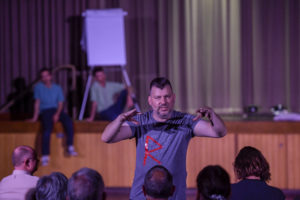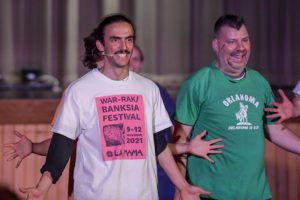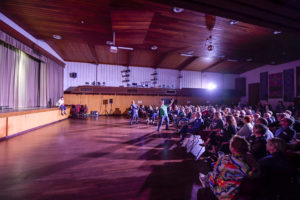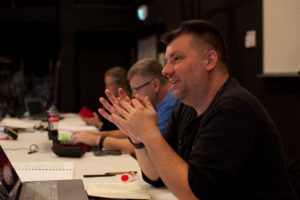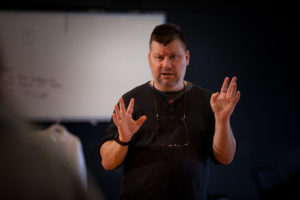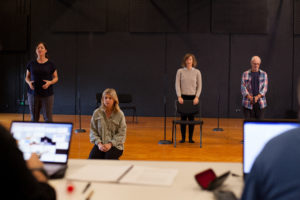[metaslider id=71]
A NOTE ON GRAND THEFT THEATRE, ADELAIDE FESTIVAL 2024
Images by Roy Van Der Vegt
When we talk about Grand Theft Theatre we usually try to explain it as an act of collective memory. Or of summoning the theatre ghosts that continue to haunt us. Of course, both of those things are true. But the more times we return to this show (Adelaide marks its third iteration), the more it feels like that Grand Theft Theatre is an attempt to understand ourselves via our collective obsession with our chosen artform.
The structure of Grand Theft Theatre is simple – 6 artists reflect upon, then attempt to create an echo of, a moment from a theatre work that was in some way significant to us. We each do this twice, though there are many more than 12 performances that reverberate throughout Grand Theft Theatre. Our memories of these shows are always partial, sometimes confused, and often colored by the context of how and when they were viewed. Our attempts to recreate moments from these shows, without means and shorn of context, are always doomed for failure. But something in these ever-failing attempts remains compelling – the struggle to articulate precisely why theatre feels so important to us all.
It’s somewhat of a cliche to consider theatre as a religious practice for secular people, but it is nevertheless true that there is something about theatre that connects us to something ever-so-much vaster than ourselves. Grand Theft Theatre is a stumbling attempt to map the contours of this vastness.
David Williams, March 2024
CO-WRITER & DIRECTOR’S NOTE FOR GRACE UNDER PRESSURE
Back in 2017 Paul Dwyer and I, with the support of the Sydney Arts and Health Collective, set out to make a theatre work that might open a broader public conversation about some of the persistent workplace issues facing health workers. Grace Under Pressure is based on interviews with doctors and nurses and asks: how do we as a society care for those who devote their lives to caring for us? Can a doctor or nurse give a patient the best possible care if he or she hasn’t slept for days? What if they are also being bullied or sexually harassed at work? What if they complain about having to work excessive hours, but are told to stop whinging and suck it up? How do they cope with the pressure?
We interviewed around 30 people – physicians, surgeons, interns, registrars, nurses, a paramedic, a hospital administrator and even a union official. Despite a wide range of ages (from mid-20s to early 70s) and experience levels (from medical students to recently retired), stories of bullying, discrimination, harassment, overwork, and burnout were distressingly common. But amongst all this there were also stories of humour, joy and satisfaction – genuine human connections amongst the labour of care. In creating this show we tried to do justice to all of these stories, so generously offered by our interviewees.
It’s fair to say that Grace Under Pressure feels very different in 2021. The central question driving this show – how we care for those who care for us – has gained deeper resonance in this continuing global pandemic, when new barriers to caring for our carers have emerged. From doctors forced to move out their family homes to reduce the potential risk of infection, to PPE shortages, to nurses being abused at petrol stations for walking in their uniform, healthwork in a pandemic has brought new anxieties. How might we better care for our care-givers at such a time?
I hope that Grace Under Pressure might help all of us to think more deeply about this complex and challenging issues, and together begin the work of first imagining, then building healthier health care cultures and systems.
David Williams, April 2021
Program note for QUIET FAITH by David Williams
“I would have said probably ten years ago, it would have been unthinking for a Christian in the conservative churches to not vote Liberal. Like, it was like, just a given; if you’re a Christian, in the scenes where I was in at least – if you’re a Christian you vote Liberal and that’s just how it is, you know?”
QUIET FAITH INTERVIEWEE, 2014
A few years ago I was working on another theatre project whose subject matter began to reflect upon issues of religion and politics. There was great concern amongst the artistic team about the alignment of the Christian right and neo-conservative politics, an alignment especially visible in the United States but increasingly being reflected in Australia via the efforts of the Australian Christian Lobby, and the formation of political parties dominated by conservative Christian ideas, such as Fred Nile’s Christian Democrats and Family First.
Whilst I shared the political concerns of some of my fellow artists, their forceful assertion that Church and State should be kept separate by preventing anyone religious from any form of public office seemed to me an extreme, anti-democratic position. Whilst the abuses committed or overlooked by those in authority in various religious organisations must absolutely be condemned, it seems unjust to believe that religion is, in itself, a negative cultural force. The voices that claim to represent Christianity in the public sphere offer strongly conservative views, especially on social issues. Despite this, I have found all of the Christians that I have encountered to be deeply compassionate and loving people, each genuinely striving to make the world a better place.
In developing Quiet Faith, I undertook recorded interviews with twenty Australian Christians from different denominations, as well as dozens of conversations with believers from across Australia. These interviewees ranged in age from late teens to early seventies. Some were students, some were educators, some were social workers, some were health workers, and some were religious leaders – ministers and pastors from suburban and regional churches. My conversations were structured around three key questions: how would you describe your journey of faith? How does faith manifest itself in your everyday life? And, what do you think is, or should be the relationship between religion and politics?
Quiet Faith is an attempt to listen closely to these voices and thereby start rethinking the place of faith in public life.
DAVID WILLIAMS

